Scotland’s Buses 2023









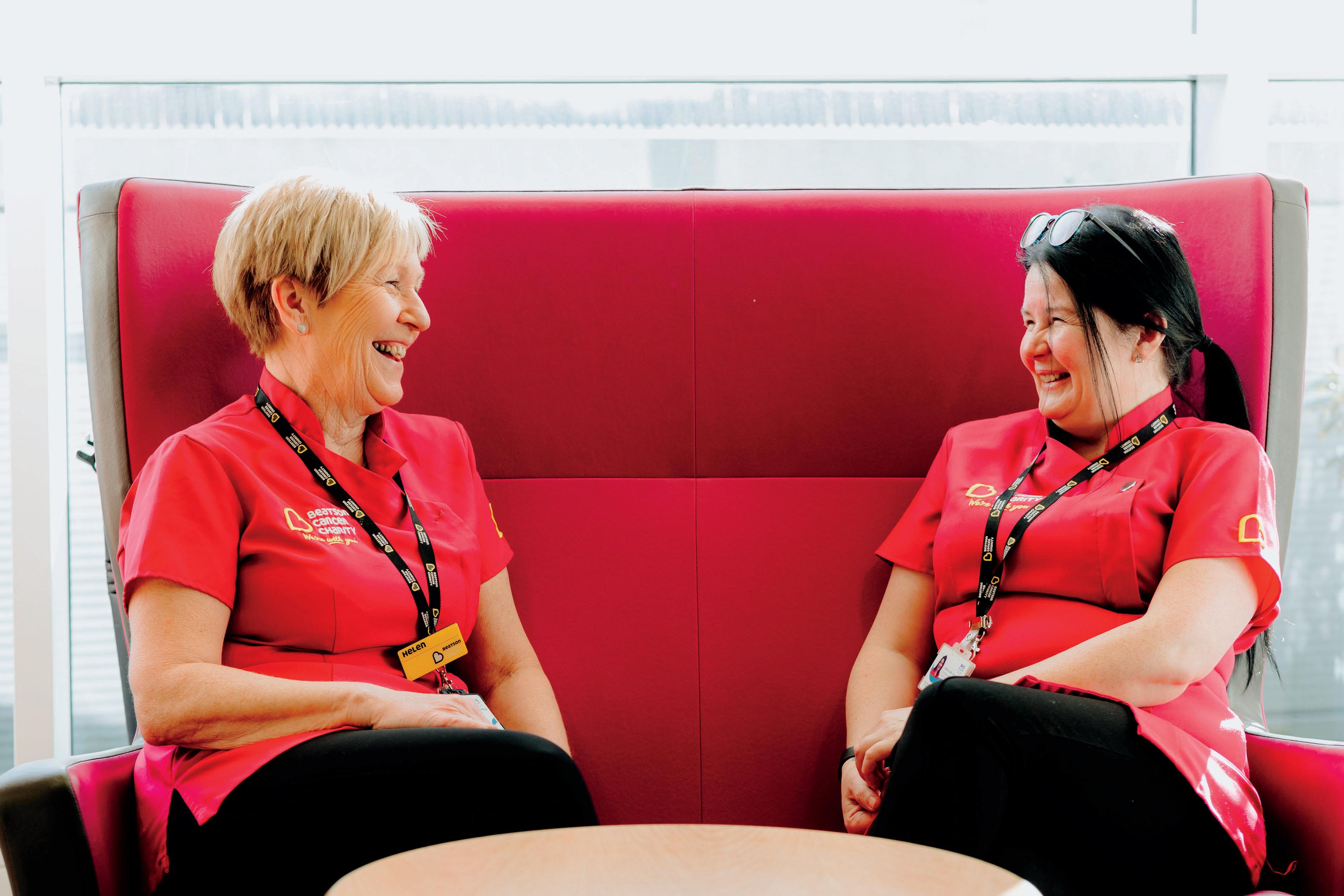
Y o u r d o n a t i o n s h e l p u s i n v e s t i n a b r i g h t e r
f u t u r e f o r t h o s e l i v i n g w i t h c a n c e r .
W e l l b e i n g C e n t r e
S p e c i a l i s t H e a l t h a n d W o r k a d v i c e
C o m p l e m e n t a r y t h e r a p i e s
B e r e a v e m e n t s e r v i c e s
G r o u p s u p p o r t
B e f r i e n d i n g s e r v i c e s
W i g f i t t i n g
P o d i a t r y
C P T S c o t l a n d p r o u d l y s u p p o r t s
C P T S c o t l a n d p r o u d l y s u p p o r t s
B e a t s o n C a n c e r C h a r i t y
B e a t s o n C a n c e r C h a r i t y
find out more:
find out more:
b e a t s o n c a n c e r c h a r i t y . o r g
b e a t s o n c a n c e r c h a r i t y . o r g

Welcome to Scotland’s Buses 2023. Tis special publication from Passenger Transpor t places the spotlight on Scotland’s bus and coach industry and its partners, celebrates their achievements and considers the challenges they face. Published in association with CPT for a sixth time, this year’s edition incorporates the ofcial Conference Workbook for the 45th annual CPT Annual Conference, which takes place at the Glasgow Hilton Hotel on October 2-3


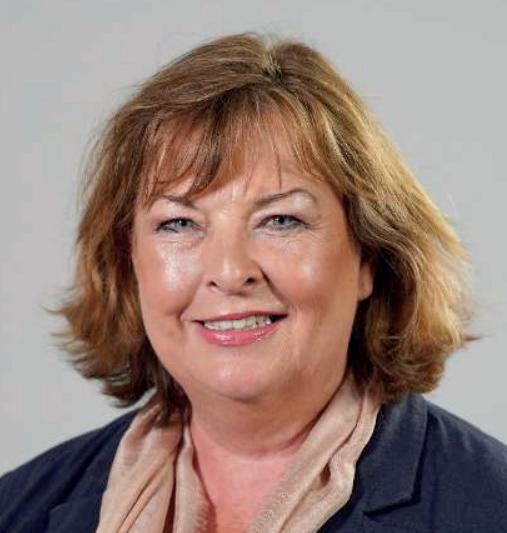



It’s great to see the CPT Scottish Conference return afer a four-year break, and to take this opportunity to contribute to Scotland’s Buses 2023. Much has happened over the past four years and there is lots to look forward to in this exciting industry.
Te Scottish Government is committed to bus as a sustainable transport option to achieve modal shif, as part of our world-leading climate change ambitions. We work in a spirit of collaboration alongside local authorities and bus operators to ensure that everyone has accessible public transport regardless of where they live.
Earlier this month, regulations were laid in the Scottish Parliament to give local transport authorities more options to improve bus services in their own areas.

Te regulations give authorities access to the remaining bus powers within the Transport (Scotland) Act 2019, which was designed to delegate more fexibility to respond to local challenges and empower local authorities to help us make Scotland’s transport network cleaner, smarter and more accessible than ever before.
As well as running their own bus services, local transport authorities can now work with operators to further improve the quality and efciency of local services through a Bus Services Improvement Partnership or to develop a franchising framework, where the authority sets out
the services to be provided and standards to be met within an area, contracting bus operators to run them.
To support local transport authorities to explore the full range of options now available through the Transport (Scotland) Act 2019, including local authority-run services, Transport Scotland has launched the Community Bus Fund.
Part of the Bute House Agreement with the Scottish Green Party, the fund is another important example of collaborative working. My ofcials worked with ATCO and COSLA representatives in the design of the fund to align with the Verity House Agreement and this government’s preference that the fund be targeted towards areas of rural deprivation.
Te Community Bus Fund aims to improve access to bus services, for example by upgrading bus stops and installing real-time electronic timetables; encourage integration between transport modes, perhaps by installing infrastructure like mobility hubs; and trial innovative solutions
or improvements to encourage patronage or increase efciency.
Another key area of investment is the Bus Partnership Fund (BPF), through which funding is awarded for bus priority infrastructure to tackle the impacts of congestion on bus services. To date we have awarded £26.6m to Partnerships, made up of operators, local authorities, and others, to identify, develop and deliver bus priority across Scotland.
I welcome the strong collaborative working that is happening in Partnerships around the country and it is good to see this delivering for passengers. To date the fund has delivered trafc light equipment to help buses get through them more quickly in Inverness, Glasgow and Ayrshire, bus lane cameras and have made
several temporary bus priority measures permanent across Scotland. Bus gates have just opened in Aberdeen City Centre benefting millions of passengers a year, another at Raigmore Hospital in Inverness is due to open soon and I look forward to seeing other transformational projects being delivered across the country.
We also expect that bus priority measures will leverage other improvements, such as improved services - with faster, more reliable services encouraging people to leave their cars at home, further reducing both congestion and emissions.
Since 2020, Transport Scotland has awarded almost £113m to help operators to acquire new zero-
“I welcome the strong collaborative working that is happening in Partnerships around the country and it is good to see this delivering for passengers”
emission buses and supporting infrastructure. Tis has brought the total number of zero-emission buses from fewer than 20 to nearly 600, either on the road or on order. Scotland currently has around double the proportion of its feet already converted to zero-emissions compared to the proportion in England.
Tis includes 548 acquired through the Scottish Ultra Low Emission Bus Scheme (SULEBS) or its successor, the Scottish Zero Emission Bus Challenge Fund (ScotZEB). Te second phase of ScotZEB extended the ofer of support to community transport, school bus and coach operators to transform their vehicles to zero-emissions and install infrastructure which can be shared with other feets to help
them make the switch too.
Applications to ScotZEB 2 closed recently and I’m really looking forward to seeing how the bus and fnance sectors continue to deliver excellence for Scotland and truly transformational, collaborative change.
A real source of pride to me as Transport Minister is that Scotland provides free bus travel to a larger percentage of the population than schemes elsewhere in the UK, with more than two million people eligible - encouraging more people to choose to take the bus and leave their cars at home.
In January 2022 we launched the scheme for Young People, in addition to ofering free travel to those over 60 and with disabilities.
whose lives are literally being transformed by having free bus travel - from families on low incomes whose children or young people might not otherwise have been able to take up new opportunities. Te scheme is also providing opportunities for new and increased bus services as more people choose bus regularly, beneftting communities across Scotland, not just those who travel for free. I hope that by embedding sustainable travel habits from an early age, we will encourage young people to keep using public transport throughout their lives.
To encourage even more people to choose to take the bus, we are progressing the Fair Fares Review to ensure a sustainable and integrated approach to public transport fares that supports the future long-term viability of our public transport system. Te review is considering both the cost and availability of services and the range of discounts and concessionary schemes which are available to ensure our public transport system is more accessible, available, and afordable, with the costs of transport more fairly shared across government, business, and society.
Te Scottish Government also convened the Bus Taskforce to address immediate challenges facing the industry including driver shortages, which have been exacerbated by Brexit, patronage growth and community engagement with a wide range of stakeholders. Te Taskforce has now concluded and we will be publishing a report of its work and recommendations.

Since then more than 84 million free bus journeys have been made by under 22s across Scotland, giving children and young people the very best chances to succeed in life by improving access to education, leisure, and work, and making sustainable travel more afordable. It means they can get to work, college, or get on with the daily necessities without worrying about the cost.
Every day, we hear from people
We all have a part to play in tackling the global climate emergency and there is no doubt that bus, as one of the most climate-friendly transport choices the public can make, has a vital role to play in supporting the Scottish Government’s worldleading commitment to reducing car kilometres by 20% by 2030. By investing in our public transport and in our transport infrastructure in a way which encourages people to leave the car at home and travel by bus, we can create a lasting legacy to be proud of.
“Every day, we hear from people whose lives are literally being transformed by having free bus travel”

Scotland’s bus and coach industry needs allies in order to fulfl its potential.
Tis doesn’t just mean the potential of bus operators to make a proft and grow, an aspiration for any business. It’s also the potential for buses and coaches to play an important role in achieving a just transition to net zero, a mission which requires enormous strides over the next decade.
Even those who profess to be allies can fall short and the industry needs to advocate for itself. For the past 18 months, Duncan
Cameron has been carrying out that task in his role as chair of CPT Scotland, in addition to his duties as Managing Director of First Bus in Scotland.
Public transport is ofen used as a political football, with politicians adopting stances for short-term electoral gain. An example of this is Aberdeen’s bus gates. Having spent nine years at First Aberdeen, a business that he continues to oversee in his current role, Cameron knows the positive impact that their introduction will have on bus services in the city.
Having restricted the freedom of motorists, the scheme has
attracted fury in some quarters. However, the new road layout aims to reduce travel times for buses in the city centre and the city council hopes that this will encourage more people to use sustainable or active travel.
It is the frst major scheme to be funded by the Scottish Government’s Bus Partnership Fund - a landmark £500m investment in bus infrastructure, which was initially announced back in September 2019. Te hope among bus operators is that the years ahead will bring a steady succession of similar gamechanging schemes like this.
First Aberdeen’s Open Day on August 26 was an opportunity to make the case for the bus gates and explain how the bus operator would reinvest the savings achieved. However, Cameron was disappointed to encounter opposition from a politician who he had hoped would support the scheme.
“We are, of course, against the bus gates because we’re in opposition, so we need to be showing our opposition,” he was told.
“Okay,” said Cameron. “So what are you going to do to address climate change?”
Tere was no response.
It’s a question that the sector will ask again and again over the next decade to ensure that politicians and other stakeholders help it to move forward
Tere are huge challenges facing the bus and coach sector, such as rising costs, labour shortages, decarbonisation and post-Covid changes in travel behaviour – but there are also huge opportunities. Not least among those opportunities is the Scottish Government’s ambitious commitment to reduce car kilometres by 20% by 2030.
Cameron argues that the bus and coach industry has a good track record and that provides a platform to build on.
“I don’t think the [bus and coach] sector should lose sight of what’s been achieved in recent years,” he says. “It has shown signifcant agility and all operators deserve a great deal of credit for coming through that.”
He also credits the Scottish Government for providing the funding during Covid that was required to maintain local bus services.
“As that funding changed and then ultimately was eliminated, [bus] operators are showing a huge agility to be fexible with services, at a time when the country, the UK, is sufering from an almighty labour shortage. Let’s not forget that.”
Despite the many and varied challenges, Cameron believes that the sector has adapted and achieved some stability, with operators responding to new patterns of travel behaviour.
Patronage for First Bus in Scotland is now broadly in line with pre-Covid levels, sometimes it’s above and sometimes it’s under. It varies on a route by route basis, and within diferent demographics.
“In Aberdeen we’re pretty much there. In Glasgow we’re probably closer to 90-95%,” reports Cameron.
Te introduction in January 2022 of free travel for all of those aged under 22 has provided a huge boost in some areas, helping to ofset the post-Covid reduction in travel by holders of Scotland’s
‘over 60’ bus pass.
Te peak has blended out, with many more people now working at home on a full- or part-time basis. In many places, the morning peak is now driven by school journeys.
Te introduction of the under 22s scheme saved local authorities money on the provision of school transport, and the increase in demand for school travel on buses has seen operators amend their commercial timetable to accommodate that.
Tere is no doubt that the under 22s scheme has helped operators to adapt to the withdrawal of Covid funding. Tis was essential given that bus company costs have risen by 25% in the last three years – a rate which bus operators have been unwilling and unable to ofset with fare increases.
Te Bus Partnership Fund was formally launched in November 2020 to provide a £500m boost for infrastructure schemes. Te intention was “to bring forward a step change in investment to make bus services greener and more punctual and reliable so that more people make the choice to take the bus”.
Almost three years later and bus users have yet to see the benefts. Aberdeen’s bus gates are the largest project to have materialised. Cameron says that projects like this are essential because they create a virtuous cycle. Te faster journeys are attractive to bus users – as well as those who might not have previously chosen the bus – but the cost savings can be reinvested by operators in their services, helping to make it even more attractive.
Aberdeen’s bus gates have been controversial and Cameron sees the need to provide evidence of the benefts as quickly as possible – to help justify the pro-bus changes to city centre trafc fows.
“Te local authority [Aberdeen City Council] should be commended for carrying that out and we want to evidence the success of that as soon as possible,” he says.
had more of an impact. Local authorities are fnding the business case threshold represents a difcult hurdle to clear, although he understands that the Scottish Government needs to demonstrate value for money for its capital spending.
“I think we all just need to acknowledge that progress isn’t being made quick enough and we need to be asking ourselves the question, ‘What more can we do to deliver it quicker?’” he says.
In 2021 the Scottish Government decided to set up a Fair Fares Review, to ensure a sustainable and integrated approach to public transport fares.
Despite vociferous protests from the motoring lobby of a ‘war on the motorist’, it is public transport users who have endured huge real-term fare increases over the past 15 years - considerably higher than the rate of infation.
Te bus and coach sector welcomes the discussion. “Tere could well be some opportunities that come out of it,” says Cameron. “For instance, the introduction of road charging or a fare on other modes might help create demand that results in volume discounts in public transport.”
Duncan Cameron began his career initially with First in 2001 as a graduate trainee and rose through the ranks, holding such positions as Operations Director for both First Essex and managing director for First Aberdeen. Afer leaving in 2014 to work in the haulage and logistics sector, he returned to First in 2016.
He was appointed Managing Director of First Bus in Scotland on January 1, 2022, having already occupied the role on an interim basis since May 2021. Since then, he has successfully led the business through some of the most challenging times the transport industry has faced.
“If you look at what’s happening in Aberdeen it’s very much our intention, if the objectives of the bus gates are delivered, that customers and the travelling public in Aberdeen will see those benefts reinvested in higher frequencies and improved value tickets.”
It may take time for the benefts to become clear, and in the meantime Cameron sees the need to keep making the case.
“My challenge to anyone who’s against it, and most people who are against it against seeing it on paper rather than against thiswas-the-impact-on-me-today, my challenge would be that we won’t halt climate change unless we all change our behaviour.
“Tat’s what this is about. We all have to fnd a way of changing our behaviour from the reliance on too many single person car journeys.”
Tere is frustration that the Bus Partnership Fund has not
He points to the investment that his own company, and others, have made by introducing tap-on, tap-of, capped ticketing with contactless bankcards, which has helped to provide better value to bus users. Tis has removed the uncertainty from bus travel, ensuring that no one needs to worry about having the right change or whether they are buying the best value fare.
“Tere’s no excuse now,” says Cameron. “If you’ve got a card, the bus is there.”
Bus operators will be keeping a close eye on how the Fair Fares Review infuences rail fares, which are already heavily subsidised. Te Scottish Government has committed to a pilot eradicating peak time fares, but this is a decision that would impact bus and coach operators on routes where their services compete with rail services.
“Te one thing the Fair Fares Review needs to bear in mind is that it needs to pre-assess, before
“I don’t think the sector should lose sight of what’s been achieved in recent years. It has shown significant agility and all operators deserve a great deal of credit for coming through that.”
implementation, and model to ensure there aren’t unintended consequences across modes, whether it’s on the railway, whether it’s on bus, whether it’s on coach,” says Cameron.
“We all want more people to travel by public transport but I think we’ve got to be very careful that we don’t miss the point that all that’s achieved is the railway grows at the expense of bus and vice versa.”
He adds: “In Glasgow, that’s a real risk for ourselves. Rail travel gets cheaper then becomes more attractive to people who potentially are using the bus just now.”
A political football
Cameron laments that public transport is too ofen used as a political football. For example, in August, Scottish Labour circulated Trafc Commissioner statistics showing a 38% decline in local bus routes in Scotland between 2007 and 2023. Scottish Labour leader Anas Sarwar commented: “It’s time to help councils bring buses back into public hands so we can run services for people instead of profts and deliver the reliable, afordable services we need.”
“Te information they used was not factually correct,” says Cameron. “Tey have interpreted it wrongly and CPT has written to them on that point … If we want the climate emergency to be solved, and transport has a huge part to play in it, we’ve got to stop politicians using transport, public transport, as a political football.
“What was said is missing the point and the Labour politicians know themselves it’s missing the point. What is going to really make a signifcant improvement is addressing journey times.”
Amid all of its challenges, the bus and coach sector is working hard to reduce its carbon impact. A leader in the transition to a low-carbon future, First Bus has pledged to transition to an entirely zero-emission bus feet by 2035.

operators have really stepped up to the plate with signifcant levels of investment that dwarf the proft that’s been earned in recent years through Covid.”
However, the Scottish Government’s aspiration is that the current round of zeroemission bus funding - ScotZEB2 - will be the last, a decision that may slow down the transition to zero-emission buses.
“Tat is going to be very challenging for the bus sector to achieve,” says Cameron.
“
Tere’s a bit that’s needed [to bridge the funding gap], but there’s also a lot of time to go. So we’re at 30% zero-emission feet just now in Glasgow. Once all 25 hydrogen buses come on stream in Aberdeen we’ll be at 40% there, which I would argue is very good going. It gives us a clear roadmap to our 2035 zero emission target.”
He continues: “Credit where it’s due, that is in part down to the Scottish Government is more progressive than all four nations in terms of that funding. So, the industry north of the border has time on its side at the moment.”
However, he warns that the fnances don’t yet add up for zeroemission buses. Te unit costs are becoming more expensive rather than reducing.
“What could make a huge diference to the fnance of the feet is if more pro-bus measures were put in place that resulted in more passengers travelling on those vehicles, which therefore helps all operators achieve the business case behind investing in zero-emission,” he says.
He points out that the transition can be even harder for smaller operators. Many of them are fulflling contracts for local authorities that may be withdrawn if cuts are required, leaving them with expensive zero emission vehicles but no work.
With a large proportion of bus users (those aged under 22 or over 60) now receiving free bus travel, the rate of reimbursement provided to operators for carrying them is a hugely signifcant part of their fnances.
“You need the certainty of the reimbursement on which to base your network against,” says Cameron. “It is under review. Tere’s a long way to go. We’re in the early stages of that review.”
From the industry’s point of view, the mantra has always been for concessionary travel reimbursement to ensure that they’ll be ‘no better, no worse’ as a result. However, Cameron is keen for the government to ensure
that cost infation and changes in passenger behaviour are refected in any revision to rates.
Labour shortages
Labour shortages forced many bus operators in Scotland and elsewhere to reduce mileage. It remains a problem but there has been progress.
“I think the industry has adapted to deal with it better than 18 months ago,” says Cameron. “I wouldn’t say we’re on the home straight. We have grown our frontline workforce by 10% over the past 18 months, but we have spent, we’ve been very creative with our advertising. We spent a lot of money on attraction. Wage rates have increased to be more competitive in local markets.”
Cameron believes shortages have reiterated the importance of the frontline employees in the bus and coach industry.
“Te frontline employee was always very important,” he says. “But I think all operators would acknowledge they are working harder to recognise that, to understand why people are leaving, and working as hard as possible at identifying gaps that stop people leaving.”
Te shortages have been aggravated by older employees dropping out of the workforce and Brexit, which ended the free movement of labour between the UK and European Union. Cameron and his industry colleagues are frustrated that EU bus drivers cannot be recruited to fll gaps in the labour force.
Optimistic about the future Scotland’s bus and coach sector has demonstrated its agility in response to the many challenges it faces. Moving forward, Cameron believes it is now well positioned to beneft from eforts to limit climate change – if it gets the support it needs from politicians and other stakeholders.
“Te Scottish Government has been progressive so far with funding rounds [to support the introduction of zero-emission buses], which has helped,” says Cameron. “But, you know, Shout it from the rooftops: Buses have a vital role to play in reducing emissions
“I think the sector should be positive and optimistic about the future,” he says. “We all have a climate emergency to respond to and the [Scottish] government has set an objective of 20% reduction in car kilometres by 2030. And bus and coach can play a huge, huge role in achieving that.
“But, you know, we can’t do it ourselves.”
“What could make a huge difference to the finance of the fleet is if more pro-bus measures were put in place”
“It’s absolutely mad where bus drivers sit as a profession on the shortage occupational list”

Stagecoach celebrated the launch of the UK’s frst fully-electric city bus network in Inverness on February 2, 2023, where they were joined by then Minister for Transport Jenny Gilruth MSP.


25 brand-new zero-emission Yutong E10 buses had begun operating on all city centre routes. Te vehicles can operate from morning to evening on a single daily charge.
Te £10.8m investment was supported by the Scottish Government’s Zero-Emission Bus Challenge Fund (ScotZEB). Charging infrastructure was successfully installed at the Inverness depot ahead of the launch. Stagecoach uses 100% renewable electricity across the business.
Gilruth said: “With this signifcant introduction of 25 new electric buses, Stagecoach is showing a welcome commitment to help meet Scotland’s worldleading climate change targets.
Stagecoach Highlands Managing Director, David Beaton, said: “I am incredibly proud to be able to say that we’re now operating the UK’s frst fullyelectric city bus network here in Inverness. It is a challenging time for the industry, and we still have some way to go, but we’re absolutely committed to improving public transport for our customers across the Highlands.”
Stagecoach launched a further fully-electric city bus network in Dunfermline in March 2023, and its network in Perth will go all-electric before the end of the year.
Te Scottish Government ofcially announced the launch of the second phase of the Scottish Zero-Emission Bus Challenge Fund (ScotZEB) in May 2023, allocating up to £58m for the initiative.
ScotZEB, introduced in 2021, replaced existing funding streams and aimed to incentivise the bus industry to explore fresh and innovative fnancing avenues for zero-emission buses and infrastructure. With the expansion of eligibility to include coaches and community transport providers, the second phase seeks to hasten the transition to a netzero future in those key sectors.
Up to £58m is being ofered, which would be available for drawdown during fnancial years 2023/24, 2024/25, and 2025/26.
Paul White, director of the Confederation of Passenger Transport in Scotland, said:
“
Tis further round of ScotZEB will help support operator investment in Scotland, which is already leading the charge to Net Zero across the UK.”
White also welcomed the inclusion of coaches in the scheme, recognising their signifcance in bolstering Scotland’s “green tourism”.
Growing Scottish bus operator McGill’s announced the appointment of Alex Hornby to the new position of Group
Managing Director in May 2023, following signifcant expansion in recent years.
A well-known fgure in the UK bus industry, Hornby was previously Chief Executive of Harrogate-based Transdev Blazefeld. In his new role he will report to the bus operator’s board, led by chief executive Ralph Roberts.

“I am hugely excited at the opportunity to manage a class-leading, successful and ambitious organisation, now the biggest independently owned bus company in the UK … and one of the largest operators of zero-emission electric feets in the country,” said Hornby.
“Te future for our industry is bright if - across both the operator sector and in government - we all grasp the right opportunities and align ourselves to zero-carbon, economic growth and congestionbusting agendas that the bus can help to realise.”
McGill’s has seen rapid expansion in recent years following the purchase of Xplore Dundee from National Express in 2021 and last year’s acquisition of First Scotland East, which have been subsequently rebranded as Eastern Scottish and Midland Bluebird.
“Alex’s drive and passion will signifcantly strengthen the McGill’s group leadership team and ensure that we continue to develop the current business as I focus on our exciting growth plans,” Roberts said.
FlixBus launched its expanded Scottish network in April 2023 with celebrations and free cake at Edinburgh bus station.
Te move came not long afer the global intercity coach service brand celebrated two anniversaries - its second anniversary in the UK market and the tenth since it its creation.
largest independent bus operator, marked a fve-fold expansion.
Te partnership between McGill’s and fast-growing FlixBus began in 2021, fuelled by a joint ambition to disrupt the coach market. McGill’s has added 18 high specifcation Volvo 9700 coaches to its FlixBus services, in addition to the existing seven vehicles.

Speaking at the Edinburgh bus station launch last week, Andreas Schörling, managing director of FlixBus UK told Passenger Transport: “We were very clear when we entered the UK market that we are here to build the largest intercity coach network in the UK. It’s going to be a fve-year project. We are ... strategically patient, but that is the clear vision that we have.
“
Te frst two years have been, I would argue, almost beyond expectation. We’ve
seen phenomenal uptake from passengers. Tere is massive demand.”
In February 2023 a new WPI Economics report, commissioned by the CPT, showed how major benefts could be reaped by levelling the playing feld between private motoring and public transport in Scotland.
Tis followed a study last year which showed that attracting drivers to switch some journeys to bus or coach was necessary to meet Net Zero targets. Tis would produce signifcant economic, social and health benefts and be achievable given people’s support for tackling climate change.
With a 70-year decline in bus travel, the report made clear that focusing on one policy alone won’t get the job done. For example, it showed how increasing motoring costs in isolation would hit those who don’t have any other option to use their cars, particularly lower earners. Meanwhile, making bus travel free across Scotland would cost millions without having a signifcant impact on people’s travel choices.
Te report called for a realistic, fair and politically achievable package of policies to encourage
people to switch two car journeys a month to bus or coach. Tis would ensure a reduction in emissions of 1.1 million tons of CO2, equivalent to the total transport emissions in Aberdeen.
Paul White, director at CPT Scotland, which commissioned the report, said: “Tis is why decision-makers in Scotland should get on board with bus policy packages because they are fair and achievable measures to slash carbon, generate new tax revenue, create more jobs and make people healthier.”
Te Scottish Government’s commitment to investing over £500m in bus priority infrastructure has yet to be fully realised, concluded a report by Transform Scotland in April 2023.
Te Bus Partnership Fund was launched in 2019 to invest in bus priority measures on local and trunk roads. Te fund has allocated £25.8m for appraisals, business cases, and small-scale interventions, known as ‘quick wins’. However, Transform Scotland reported that no substantive infrastructure has been funded yet.
“It looks increasingly unlikely that the goal of
Te expansion in Scotland, undertaken in partnership with operator McGill’s, Scotland’s The
investing over £500m in improved bus priority is going to be met in the short or medium term, although it may be achievable within the lifetime of the next Scottish Parliament,” said Chris Day, Transform Scotland’s Policy Advisor.
He admitted the Scottish Government’s plans were ambitious, particularly given the lengthy development and consultation phases of major projects. Day continued: “Te challenge for scheme promoters and their allies is dealing with the opposition that inevitably arises when specifc plans are published. Te Bus Partnership Fund is getting spent currently at less than £9m annually, whereas the original plan implied that it would be spent in fve years.”
Paul White, director of the Confederation of Passenger Transport Scotland, called for a full review of bus funding in Scotland following the end of the Network
Support
funding stream on March 31, 2023.
Ending the emergency postCovid-19 funding stream made Scotland the frst part of the UK to remove pandemic recovery support mechanisms for buses. Removal of the funding soon led to announcements of steep network cuts by several Scottish bus operators.
Writing in Te Scotsman, White said that claims that the Scottish Government had provided comprehensive support for the bus sector failed to take into account what this funding consists of and how it measures up against spending on other transport modes.
“Te budget to support the rail franchise is 13 times greater than the budget to support the bus sector, despite buses carrying almost fve times as many passengers,” he said. “Te support grant rate for buses has not increased for over a decade.
Meanwhile, as operational costs have grown, investment in zeroemission vehicles - to meet the government’s ambitious net-zero targets - has soared to more than £130m over the past four years.”
Te frst registered bus service in the world to use full-sized autonomous buses began carrying passengers across Scotland’s Forth Road Bridge in May 2023.


CAVForth is one of the
most ambitious and complex autonomous bus trials worldwide. Te project is led by Fusion Processing Ltd in cooperation with project partners Stagecoach, Transport Scotland, Alexander Dennis, Edinburgh Napier University and Bristol Robotics Laboratory. It is co-funded by the UK Government’s Centre for Connected and Autonomous Vehicles.
Te service, which had been
scheduled to start carrying passengers between Ferrytoll Park & Ride in Fife to Edinburgh Park interchange during 2020, fnally commenced operations on May 15.
Te project’s feet of fve Alexander Dennis Enviro200AV buses, equipped with Fusion Processing’s CAVStar autonomous drive system, now operate a scheduled passenger service seven days a week on Stagecoach’s new AB1, departing every 30 minutes.
Te 14-mile route crosses the Forth Road Bridge and is made up of A-roads, motorways, bus lanes and private land. It includes a range of complex trafc manoeuvres such as roundabouts, trafc lights, and ‘weaving’ motorway lane changes. Te vehicles will travel in mixed trafc up to 50mph.
Te number of free bus trips made by young people in Scotland passed the 50 million mark in March 2023. However, opposition MSPs said that many young people have limited opportunities to use free bus passes because there is not enough funding to sustain bus services outside of urban areas.
“Yesterday we managed to hit the 50 million target for the number of journeys that have been taken through the under-22s scheme,” then Transport Minister Jenny Gilruth said in Holyrood on March 14.
She also revealed that at the end of February, there were more than 590,000 cardholders in the young persons’ scheme, which equates to 63.5% of the eligible population.
“Tat means that approximately 340,000 children and young people have not yet joined the scheme. However, uptake of the scheme is as high as 73% among 12 to 15-year-olds and 75% among 16 to 21-year-olds - who can use it more independently. Tose who are already accessing
the scheme continue to make good use of free bus travel.”
Gilruth said that Scotland had “the most generous concessionary fares scheme in the United Kingdom, with more than two million people eligible for free bus travel”. Tis encouraged people to move away from taking the car, which was hugely important in relation to reaching Net Zero targets.
Bus operator Lothian recorded over 100,000 ‘taps’ in one day using its capped contactless payment method, ‘TapTapCap’. Te contactless system, which was introduced in 2019, reached the milestone for the frst time on

Friday, August 18, 14 days into the Edinburgh Festival season, which traditionally sees the population of the city increase in size. Troughout August, customers have been ‘tapping’ their bank cards or mobile devices to pay for travel across Lothian’s services, leading to faster boarding times during the busiest period for services in the city.
Sarah Boyd, managing director of council-owned Lothian said: “Our contactless payment system has been a real success story for Lothian since its introduction and we look forward to breaking even more records in the future.”
Provided by ticketing technology specialist Flowbird, the contactless system averages over 80,000 journey taps per day, and has logged over 5.4 million unique users in over four years of operation.
Lothian Buses was a doublewinner at the Scottish Transport Awards in Glasgow on June 22. Te council-owned operator won the award for Excellence in Transport Accessibility. Te company has a dedicated Accessibility and Inclusion function, spearheaded by its Accessibility and Inclusion Ofcer who has formed invaluable relationships with local and national charities and organisations to help the business provide an accessible network to the best of its ability.
Lothian’s LB Roads initiative was the winner of the Award for Excellence in Technology and Innovation. ‘LB Roads’ was born in collaboration with Lothian’s commercial and information infrastructure teams providing driving colleagues with a quick way of accessing information that may afect them while they are out on service. An interactive map of Edinburgh and the Lothians was incorporated into the system, and users had the option to view all current and planned diversions at a glance.
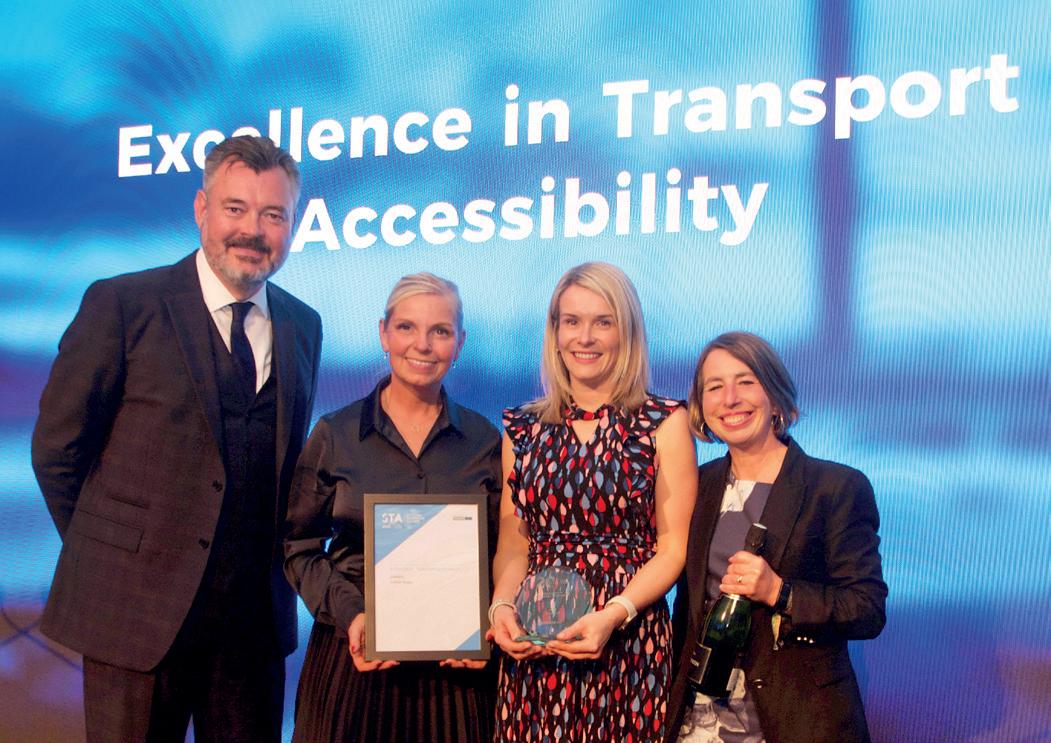
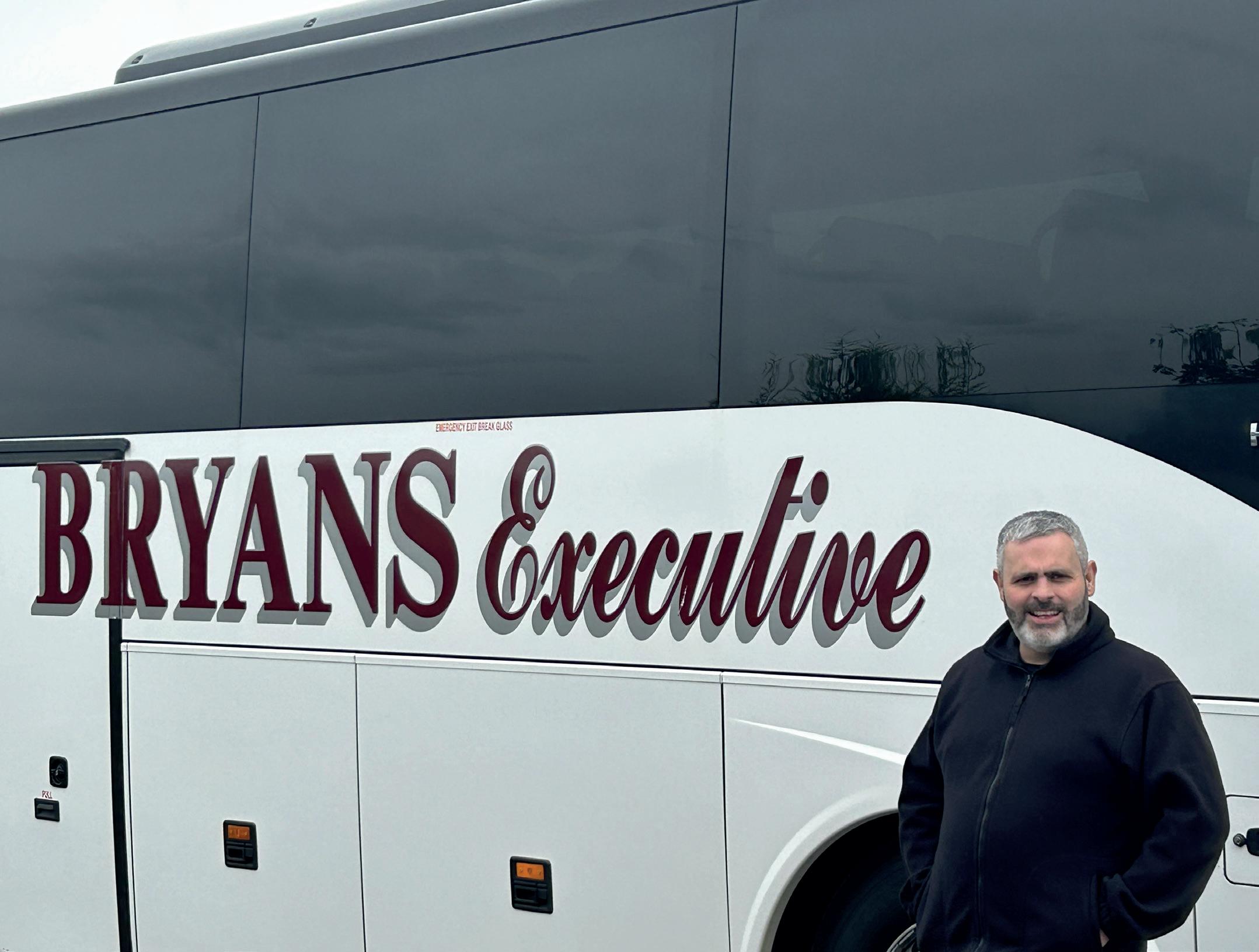
The return of the CPT Scotland Conference is to be welcomed by CPT’s many coach operator members. CPT Scotland has a long-standing tradition of including content that is relevant to both bus and coach and ensuring the wider Scottish membership is engaged and listened to. Tis year is no exception, with the CPT team
liaising with coach members to shape the format and content, and rightly so. Issues such as decarbonisation, accessibility and city planning are as equally relevant to any coach business as they are to our bus colleagues.
Historically, the need to discuss coach in a Scottish policy context was perhaps not as necessary. However, in recent years there has been more of a shif, with the Scottish Government taking a
greater interest in our sector and recognizing the value of coach and coach tourism. I can point to two examples of this, the frst being the decision to establish the Scotland Coach Operators – Covid-19 Business Support and Continuity Fund. Tis £10m fund to help coach operators whose primary source of revenue was tourism was a welcome acknowledgement of the need to support the coach industry.
I know the CPT Scotland team fought hard for this recognition, supported by members contributing data and making the case locally, and it is a testament to both the Scottish Government and CPT that the case was made so strongly and accepted.
Te second, more recent example is Scotland becoming the frst home nation to include coach operators within its decarbonisation schemes. Te
Transition Scheme provided funding for coach operators to consider whether there was a business case for their transition to zero-emission and to understand what that journey might look like. Te second phase of the Scottish Zero-Emission Bus Challenge Fund was also opened to coach operators to apply for funding for both vehicles and charging infrastructure. I still believe there’s lots more to be done if we’re going to see a ‘just transition’ to net zero for both bus and coach but there is no question Scotland is of to a strong start through its inclusion of coach.
Before the pandemic it was almost seen as a positive that coach so ofen fell under the radar of Scottish politics. However, we’ve now made a name for ourselves. We’ve shouted about the importance of coach to Scottish tourism, the sustainable nature of coach transport, and the vital local services and school contracts we operate. And, to their credit, Scottish decision-makers have ofen listened. Now, when I attend meetings of the Scottish Coach Executive Group or wider Coach Commission, I see other operators who also see the value in engagement and want to build on our successes, stay on the front foot and keep coach on the political agenda, rather than the disinterest in politics or weariness of people sticking their noses into our businesses which were maybe how too many of us felt in the past.
regularly discuss what we think government needs to do to help us decarbonise, or what actions local authorities should take to welcome coach tourism. Now is the chance to hear their views and ideally fnd ways we can work together for all our beneft.

Take decarbonisation for example. I have welcomed the inclusion of coach in ScotZEB2, but the Scottish Government has announced this will be the last funding round to assist operators with the costs of replacing their feets. We’re stopping just as coach is getting started. Tere are many coach operators, myself included, who will look at the business case, the vehicle types we might need, the issues with ftting our depots with charging infrastructure, and conclude, with good reason, that we’re not ready yet. A case could be made that decarbonising coach, community transport and other rural services will need more, not less, government support. How do we work with government and
other stakeholders to make sure that net zero targets are achievable and fair?
In terms of coach tourism, I think we’re still under appreciated and undervalued by local government. It has been a longterm struggle to get cities to allocate spaces for coach drop-of and parking, with proper facilities for our drivers. Unfortunately, rather than the situation improving we are now seeing some decisions that seem to be designed to actively discourage coach visits, for example, the removal of coach parking bays and the introduction of measures to limit our access to city centres. It seems crazy that while we read headlines about struggling city centre economies and the need for people to travel more sustainably, some local authorities seem disinterested in welcoming coach loads of tourists, arriving by the most sustainable form of road transport. What more do we need to do to make the case for coach locally? How do we demonstrate that coach is part of the sustainable and active travel solution that local authorities wish to promote?
Finally, I’m looking forward to the Conference panel session on accessibility. Te DfT’s call for evidence on what is next for PSVAR has recently closed. I think we all have a shared desire to be more accessible for our customers, be that through wheelchair accessibility, audiovisual information, or how people access information and pay. I’ll be interested in whether the panel thinks we’re prioritising the right things and have the right solutions for each issue. We can’t fall by the wayside when it comes to accessible travel, just like we can’t be lef behind on decarbonisation.
Conference allows operators like me to give our thoughts on issues like these, to hear from others in similar situations and to leave with a clearer steer on what direction we’re all heading.
I’m hoping this is apparent to anyone attending the CPT Scottish Conference this year and I hope many of my coaching colleagues are in attendance for the event and for the Coach Commission meeting that will follow on the 3rd of October. First and foremost because Conference is always a great opportunity to catch up with friends and enjoy the social side of the event, afer only seeing each other on Teams for far too long. Secondly, because I know from speaking to the CPT Scotland team that we’ll likely see more public sector representatives at this year’s event. As a sector, we The Scottish Government has recognised
As the Chair of Coach Commission, I would like to thank the CPT Scotland team, Paul, Sara and Debbie, for all the work that has gone into resurrecting Conference and making sure its content applies to all members. I would like to especially thank the sponsors that have made the event possible. When we’re talking about how hard the past few years have been for operators and the tough operating landscape, we can’t forget the same holds true for our suppliers. Tat they have found the time to attend and to fnancially support it shouldn’t be taken for granted and I hope to hear their voices represented in the business sessions too.
I was honoured to be appointed CPT Scotland Coach Commission Chair and I’m proud of the work CPT Scotland has accomplished. I’d also like to thank my predecessor in the role of Chair, Martin MacPhail for all of his hard work and support over the past two years. I’m delighted to see the Conference return and am even more delighted that I get to submit my opinions about the event in writing for the Conference supplement rather than having to make a speech on the day! Best of luck to Duncan Cameron and all the speakers. It should be a fantastic two days.
“How do we demonstrate that coach is part of the sustainable and active travel solution that local authorities wish to promote?”
“I still believe there’s lots more to be done if we’re going to see a ‘just transition’ to net zero for both bus and coach but there is no question Scotland is off to a strong start through its inclusion of coach”

Since First Bus began operating buses, one of our core objectives has been to champion the multiple benefts of bus travel, from afordability to service reliability, embracing innovation and technology to creating a comfortable, modern and safe way to get customers to their destinations.
Our services have connected communities, boosted local economies, and adapted to the changing needs of a growing and ever-evolving population.
In the face of a climate and cost of living crisis, bus is playing a more important role than ever before in Scotland. It presents a fnancially and environmentally sustainable mode of transport and, for more and more people, ofers a viable alternative to the car.
With testing times ahead for all of us, both within and outside our industry, it is vital that we keep our fnger on the pulse of the environment’s as well as our passengers’ and prospective passengers’ needs. And so, as we gear up to tackle the challenges ahead, our primary focus is twofold: to reduce our feet’s carbon emissions and to make bus a more attractive travel option.
We are proud of the progress we have already made and of the signifcant improvements that have been introduced to help make these aspirations a reality.
Transport is the single largest contributor to harmful climate emissions in Scotland. As we play our integral part in bringing about the mammoth shif needed to turn the tides on this, we’ve
been working to bring about a modal shif, encouraging people across Scotland to make small changes to their travel habits by choosing to take the bus and leave their cars at home when they can. Collectively, these individual eforts can have a considerable positive environmental impact.
We know that it’s not just about behaviour change though – it’s about a change in the way we operate too, which is why we set out our ambitions for operations to be Net Zero by 2050 and to run a zero-emissions bus feet by 2035. Change has been constant as we strive to achieve these goals and in the past three years alone, we’ve invested over £65million in upgrading our feet and its supporting infrastructure.
Tis year, First Bus broke the milestone mark of becoming onethird emission-free in Scotland – and having a feet over 30% zero-emission in Glasgow. Tese landmark moments were reached this summer, following the arrival of over 70 new all-electric buses in Aberdeen and Glasgow. We

were also the frst in the world to bring a hydrogen-powered double decker bus into service, launching the new vehicle in Aberdeen at the start of 2021 in partnership with Aberdeen City Council. Today, there is a feet of 15 hydrogen vehicles in operation across the city, supporting the growing carbon-free eforts of our electric feet.
All of these new vehicles need the appropriate infrastructure to support them, and so much
work has taken place in the past two years to upgrade our depots. Today, our Caledonia Depot in Glasgow is the country’s largest electric vehicle (EV) charging hub, and proudly supports other local businesses’ feets as they transition to greener vehicles. Our Aberdeen and Scotstoun depots have also recently undergone considerable infrastructure upgrades to accommodate new zero-emission vehicles, with a total of 43 dual-headed, rapid charging points installed across both sites.
Te vehicles themselves are ftted with market-leading lithium iron phosphate batteries, which boast a range of over 370km on a single charge. Tat’s the equivalent of travelling from Glasgow to Aberdeen without a need to stop!
Investment in cleaner air for our communities and our environment is something that we take incredibly seriously. And paired with our eforts to incite a modal shif in Scotland, we’re hoping to take hundreds of polluting vehicles of our roads. With just one double decker bus able to replace 75 cars, the positive impact that swapping car travel for bus travel can have is resounding.
Bus priority measures
Greener buses alone won’t increase bus patronage, and breaking the habits of long-serving behaviours by encouraging a shif from car to bus isn’t straightforward. We can make noticeable improvements to the service – like free, tap on tap of technology, more comfortable seating and USB charging points – which will help make bus travel a more attractive option. But
how we prioritise road space is absolutely where it needs to go.
Pedestrians, cyclists and those travelling by bus must be put frst.
Bus priority measures are crucial in addressing congestion, improving journey times, and making buses a preferred mode of transportation. Recent developments in Aberdeen, including a substantial £250,000 investment by the local council in bus gates, mark signifcant progress in this direction.
Road priority measures, like bus gates, play a pivotal role in mitigating congestion. Tese dedicated lanes allow buses to navigate trafc more efciently, reducing delays and ensuring faster journeys. And when buses run smoothly, they become a more attractive and feasible choice for passengers, making them more likely to continue opting for bus over their car.
Te recent investment in Aberdeen’s bus gates demonstrates the growing commitment to improving urban transportation. But to validate the advantages of these measures to help us gather data which could ignite further change, close monitoring of their early performance is essential. Should they deliver the time saving anticipated, the Aberdeen priority measures will enable us to re-invest in the local network leading to additional journey options and greater value for money fares because extra vehicles wouldn’t be needed to be added to routes to cover delays caused by congestion. Tis progress brings us closer to our goal of making buses a more attractive and sustainable choice of travel.
Whilst those working in the industry clearly recognise the positive change that travelling by bus can make, we have a responsibility as an operator to be clever and creative in how we reach new and specifc audiences. We know that one of the key ways to achieve – and maintain - modal shif is to help people form good habits early. So, over the last year, we’ve made a concerted efort to get more under 22s on board.
In 2022, the Scottish Government announced the launch of the Young Persons’ Free
Bus Travel scheme, which grants all children and young people under 22, access to free bus travel. So far, thousands have been taking advantage of free bus travel but there remains a third of those eligible for the scheme still to sign up for their passes.
With Scotland’s younger generations far more conscious of their environmental footprint than their predecessors, we’re keen to garner their awareness now, so that bus travel remains their frst choice of transport as they move through life.
To help make this happen, we launched our ‘Free to Explore’ campaign, which highlighted the opportunity young people have to explore their towns and cities freely - and for free - without damaging the environment.
From selfe-tastic murals in iconic Glasgow and Aberdeen locations, to gigs with infuencers, and a ‘nursery grime’ featured in a music video ad, we’ve been busy specifcally targeting the under 22 demographic to spread this message of freedom.

Our campaign saw bus pass acquisition in local authority areas
served by First Bus, increase by 6% – with some areas increasing by over 11%. We’re proud of the progress made so far and will continue in our eforts to build a new generation of bus users.
With our rapid modifcations and unyielding concentration on transforming bus travel for the future, it can be easy to forget just how far we’ve come since our formation. But over the last year, we have been taking the opportunity to celebrate a landmark 125 years of public
transport in Aberdeen.
First Bus’ presence in Aberdeen can be traced back to 1898 when the Aberdeen Corporation Tramways was frst introduced. To mark this milestone year, we refected on our progress and thanked the communities that have travelled with us on our journey to where we are today.
Our celebrations included reviving our 1980s heritage bus design, partnering with local businesses to gif Aberdonians with 125 acts of kindness throughout August, as well as hosting an Open Day for all the family at our King Street depot, which saw vintage vehicles on display, food stalls, balloon modelling, face painting and much more. With over 4,000 visitors on the day, our open day once again evidenced just how important public transport and bus is throughout society.
With over a lifetime of service in the Granite City, it was a brilliant moment to both refect on our journey and look forward to the next 125 years as we invest in the future of bus transport.
Determined to succeed
Te route towards a more sustainable and accessible public transportation system in Scotland shows promising signs of progress. Our commitment to becoming carbon-free and the increasing prioritisation of buses are steps in the right direction.

What’s more, the prospect of a pivotal modal shif in Scotland’s transportation landscape is a positive one. However, we must acknowledge the hurdles that lie ahead. Te driver shortage issues pose a signifcant challenge, as being able to recruit and train enough drivers is essential for a robust bus network. Meanwhile, post-pandemic recovery has taken longer than anticipated but we have achieved almost 90% capacity – a stat which speaks volumes about how integral bus travel is to people in Scotland.
Despite the varied obstacles we face, our vision of a greener, more efcient, and passengercentric bus system is resolute and unblinkered. Our progress has been strong, and we will continue to pave the way for a cleaner, greener future for Scotland.
“The prospect of a pivotal modal shift for Scotland’s transportation landscape is a positive one. However, we must acknowledge the hurdles that lie ahead”









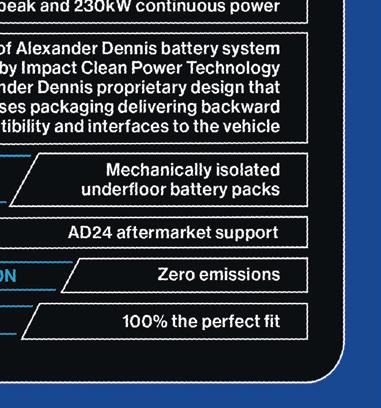



















By the end of 2020, Lothian Buses –the UK’s largest municipal bus company - had removed more than 12,000 tonnes of CO2 emissions and over 300 tonnes of NOx emissions from the local environment. An impressive fgure, and just one step along a much longer journey that the award-winning operator is currently on to achieve Net Zero.
Substantial emission reductions have been made since 2011 through the purchase of over 300 buses through its feet replacement strategy, with the entire feet currently at Euro VI standard, already streaks ahead of the enforcement date of Edinburgh’s Low Emission Zone on 1 June 2024.

“It’s a marathon, not a sprint,” says Lothian’s Engineering Director, Colin Barnes, when asked about Lothian’s investment in a greener, cleaner feet. “We have made so many advances in recent years and we’re not
stopping. It’s great to see so many companies embarking on their own electric revolutions, but behind the scenes, we’ve been getting ourselves ready frst.
Beginning his career as an apprentice, Colin worked his way through the engineering ranks in the North East of England, before joining Lothian in January 2023 to spearhead the company’s transition to Net Zero. He is relishing the

opportunity to be at the forefront of such a historic campaign for Scotland’s transport industry.
“It was a huge contributing factor for why I made the decision to come up to Scotland”, he recalls. “Lothian is a gold-standard business, everyone in our industry knows that. Te decarbonisation plan is very exciting, and my main job is to get the plan in place and begin delivering for both the
business and Edinburgh.”
Lothian’s feet currently uses 19 million litres of diesel per year, which produces 49,000 tonnes of carbon a year – a fgure the business hopes to reduce by at least 20% in the next few years.
While electric technology is the front-running energy source in Lothian’s vision, hydrogen power it is not being completely ruled out for future consideration. Although currently unproven, should evidence in the future confrm its viability, there is a role for it in the company’s decarbonisation plans.
“We’re thinking of the future and we’re on the move towards Net Zero,” says Colin. “We have done a lot of research in recent years to understand what is best for our business and what will be our option going forward.”
Having overseen a trial of both electric and hydrogen vehicles in recent months, Colin is passionate about the thoroughness of Lothian’s research into new technologies. Tis work has enabled the operator to pioneer the development of a ‘mid-life repowering’ project which involves retroftting buses which have previously operated as diesel vehicles with new electric technology. Doing so will ensure the investment made in the purchase of the former-diesel vehicle isn’t lost while introducing a lower initial-cost electric vehicle. Tis is an option being explored thanks to funding from Transport Scotland’s BEAR 5 funding programme.
Lothian’s next big project is to fully electrify its Central Garage, based in Annandale Street, Edinburgh, which is a four-year process that will result in the ability to operate over 200 electric vehicles across Edinburgh. Tey have already secured the power for the project, allowing them to begin the enormous upgrade of their infrastructure.
Colin is aware the industry has its eyes fxed on Edinburgh and how Lothian will rise to the challenge in the fght against climate change to create cleaner, better communities in which to live and work.
A challenge Colin and everyone at Lothian very much ready for. “Watch this space!” he says.
In the dynamic world of public transport, where efciency, reliability, and data-driven decision-making are paramount, Velociti Group companies EPM and Omnibus, are making signifcant strides to transform industry processes. With a rich legacy spanning over three decades, the companies are at the forefront of providing innovative solutions to this complex sector.
Nick Brookes, Sofware Director at EPM and Omnibus, believes that the companies’ commitment to driving operational efciency and boosting patronage is evident in their approach to product development with enhancements to existing solutions and plans for a new product — Control360 — which aims to revolutionise service delivery.
In early 2021, EPM acquired Omnibus, a leading transport sofware company. Since then, EPM has been working to integrate their solutions to provide more value to customers. Nick emphasises the need to bridge digital capability gaps.
“In the intricate bus operations landscape, efective management is crucial for reliable, highquality, passenger-focussed services,” he explains. “Our focus on integrating the OmniDAS depot allocation system with our existing operator control room tools marks signifcant progress. Tis cloud-based SaaS solution provides operators with real-time visibility of driver and vehicle resources, streamlining resource management and ensuring compliance with regulations and local agreements.”
In a world where operators are increasingly focusing on driver
retention and engagement, Nick highlights Omnibus’ innovative driver smartphone app, OmniENGAGE, which fosters improved communication with drivers, boosts driver retention, and facilitates efcient allocation of resources by ofering a selfservice function that takes the pressure away from depot-based allocation teams.
Tat self-service system has also been expanded to ofer an automated sign-on facility for drivers. Rather than signing on for work at a front desk in a depot, they can instead sign on for work remotely using the app. Geofencing technology ensures accurate tracking of the driver’s location, enhancing operational oversight.
OmniDAS is a cloud-native platform designed to support on-the-day operations with realtime decision-making capabilities for control room staf. It enables operators to swifly adapt to unforeseen challenges such as driver shortages and unexpected incidents. Tis semi-automated system ensures that any changes made during the day are accurately logged and processed, providing a single source of truth for payroll and HR records.
Nick highlights EPM’s Insights solution. It complements OmniDAS by ofering comprehensive data analysis tools that help identify trends and issues, fostering proactive decision-making and improved service quality.
“Tis holistic approach to operational efciency encompasses both planning and execution, ensuring that meticulous pre-planning translates into passenger satisfaction,” he adds.
While Omnibus is enhancing OmniDAS, EPM is developing Control360. It will provide operators with a comprehensive 360-degree view by unifying disparate data sources.
“Critical decisions are frequently made in the control room, and Control360 will facilitate data sharing, enabling operators to uphold their promises of delivering reliable and quality bus services,” revealed Nick. “By consolidating data from various applications, including thirdparty sources and open data, Control360 will present operators with actionable insights and early warning alerts, reducing the reliance on gut-feel decisions and fostering data-driven operations.”
One key advantage of Control360 is its seamless integration with existing EPM and Omnibus solutions, such as OmniDAS, Customer Resolution Centre and Accident Management systems. Tis integration
streamlines processes, removes data silos, and ensures consistency.
“Control360’s future roadmap includes plans to assess the fnancial implications of operational changes, helping control room staf make informed decisions that not only improve service quality but also make fnancial sense,” adds Nick. “Tis proactive approach will ensure that bus operators are equipped to handle a fast-paced and complex environment efectively.”
A glimpse into the future EPM and Omnibus are advancing their journey to provide datadriven bus industry solutions. OmniDAS is available, and integration with the EPM Trafc system is complete. Te upcoming Control360, though still in development, is set to be a gamechanger by consolidating crucial information, ultimately boosting bus service quality and reliability.
As they prepare for a phased launch for Control360 in early 2024, Nick believes operators can look forward to a future where data-driven decisions and efcient resource allocation — backed by improved communication — are the pillars of success.

“Our view is that for operators to be successful there are two sides to the equation,” he concludes. “Te frst is to become more operationally efcient and the other is in growing patronage and therefore revenue.
“We want to empower operators with data-driven tools that respond to those challenges by optimising resource allocation and responding swifly to issues. Tis not only improves service quality but also fosters growth in patronage, ultimately boosting revenue as operators deliver on their promises to passengers and build a reputation for service reliability and quality.”
“Control360’s future roadmap includes plans to assess the financial implications of operational changes”
How could you put me in that position? You’re suggesting I walk through the park to get home when I get of the bus. Everyone knows that you don’t walk through that park at night time. Especially a woman on her own.”
Tis one user’s impassioned complaint stemmed from the bus company’s app, which failed to account for safety concerns. It ofered the shortest walking route home without considering the user’s identity or the park’s dangerous reputation afer dark.
Passenger, a prominent digital technology provider for bus companies and local authorities, took action in March 2022. Tey pursued a three-pronged approach: First, gaining insights into women’s safety concerns during nighttime walks around public transport. Second, seeking guidance and support from experts and infuencers in this

feld. Tird, evaluating existing market solutions for potential adoption or development.
“We wanted to understand the general context and start to set out a strategic journey for Passenger. We started to explore social innovation and social impact areas, in general, to see if that would lead us to any useful starting positions - who is actively working in that space we could engage with,” comments Greg Hepworth, Director of Product & Design at Passenger.
He continues, “Our initial understanding was that ‘safe public spaces’ are part of what is known as Social Impact Areas. At the same time, we became aware that the concept of digital social innovation - a business model for developing solutions to social and environmental problems - seemed to be a good starting position to explore.”
Passenger found complexity in addressing user safety despite some eforts. Google Maps
included cautionary disclaimers like ‘Use caution – walking directions may not always refect real-world conditions" and ‘Use caution - may involve errors or sections not suitable for walking.’ CityMapper introduced a ‘main roads’ feature due to complaints but excluded it from bus journey planning, limiting its efectiveness. Tis approach doesn’t consistently avoid parks or footpaths, prioritising shorter routes, as seen in the park route example.
With no practical advice or policy from the Government on journey planners providing alternative or safe routes, the team at Passenger began to shape a research project to dig deeper into what it means to feel safe when accessing public transport. Supported by a Transport Research Innovation Grant, its Safe Walking Routes initiative was born. At its core, the research sought to understand users’ expectations and assess whether
it is possible to meet their safety needs. Could the sofware and the data that powers it route someone around a known troublespot such as a notorious park at night?
Expert interviews with policymakers, technologistsincluding Google - and user groups highlighted the complexity of balancing actual and perceived safety. A survey of three thousand individuals, supported by many of Passenger’s bus operator customers, including Borders Buses and West Coast Motors, provided quantitative data on safety perceptions. In-depth user interviews ofered detailed personal insights and experiences that elaborated the qualitative fndings.
By exploring multiple perspectives, the research has helped to show safety as a holistic, subjective issue involving infrastructure, technology, societal and personal factors.
“
Te difculty of coming to an agreed defnition of safety is a key lesson from the exercise. Experts and users alike all see it from diferent perspectives. We classifed diferent defnitions of safety from the research into fve categories: Physical Safety, Psychological Safety, Accessibility Safety, Road Safety and Social Safety. Interested parties can use this to help prioritise their focus”, says Damian Rees, the project’s lead researcher.
Improving infrastructure and providing assistive features will have a signifcant social impact by enabling vulnerable groups to participate. When applied thoughtfully, technology and data can enhance solutions, but human factors and collaboration - progress through partnership - remain essential. Local authorities, police, disability advocates and communities all have roles to play.
Ultimately, this project has highlighted needs, envisioned possibilities, and built foundations to progress an inclusive walking safety toolkit that empowers sofware teams and interested parties to meet the needs of diverse communities. More than anything, the case for investing in solutions that promote safe access for all is now well supported by evidence.
How could you put me in that position? Balancing the complexity of actual and perceived safety for passengers





































































































































































































































































October 2-3, 2023












Thank you for joining us at the 45th annual CPT Scotland Conference.
We are delighted to be hosting Conference once more following a hiatus since 2019.
Tose who attended our last event four years ago may recall that it was my frst as Director of CPT Scotland. I took the opportunity to outline my vision for CPT Scotland for the year ahead and my hope to grow our conference in 2020. Well, the best laid plans of mice and men gang af agley! Four years, four Transport Ministers and one global pandemic later, we are back and looking forward to discussing our sectors, and what the future holds.
Tis year will see some changes from previous Scottish Conferences. Te most obvious of these is the change in venue. Conference this year will take place at the Glasgow Hilton Hotel.

Tis relocation is no slight on the quality of past venues but is driven by the desire to fnd a location that is of the quality that CPT members would expect, but that also has excellent transport links to make the event accessible for all. Te Hilton also allows us to ofer greater exhibitor space to our sponsors and partners and should be the ideal venue for what should be two enjoyable and informative days.
Another change that should be noticeable is the opening up of our event to more of our public sector partners. Troughout the two days we will be discussing topics that involve, or are wholly reliant on the actions of, local and national governments. Tere is little point in having these discussions in an industry echo chamber and I believe these new voices will add to our sessions.
In past years I would use this introduction to summarise what has happened since the last
conference. Tankfully, the word count prohibits that. Furthermore, a focus on the future fts well with the theme of our event. Tis year’s conference title is ‘Progress through Partnership.’


We are all well aware of the seismic challenges that have faced bus and coach since 2020 and the lasting impacts we still face. Rather than dwelling on these, our business sessions are designed to spark discussion around how we move on. How do we collectively surmount challenges, generate passenger growth, and unlock the many benefts associated with bus and coach travel? What roles should local, regional, and national governments play? How do operators make their case for supportive policy and generate political will?
We are delighted to be joined by the Minister for Transport, Fiona Hyslop, to lead us into day one and provide the government perspective. Over the following
two days we have secured some outstanding speakers to tackle a range of aspects, all vital to the progress our industries; the development of a shared vision; how we design our public spaces; the role we play in public health; improving accessibility; decarbonisation; and engaging with our audience. And of course, Conference wouldn’t be Conference without our banquet on the evening of Monday 2nd October.
Te CPT Scotland Conference has long been the preeminent event for Scotland’s bus and coach sectors. While you might see some changes and some new faces, I am confdent that fact will not change. I look forward to seeing you there.




Alexander Dennis, a subsidiary of NFI Group, is the UK’s top bus and coach manufacturer with 2,000 employees across UK, Asia, and North America. We specialise in fuel-efcient, lowfoor single and double deck buses and a complete coach lineup. Our products prioritise operator, passenger, and environmental advantages with unwavering customer support.
■ alexander-dennis.com

Asset Alliance Group is an award-winning fnance company, providing specialist fnancial solutions for the bus and coach industry for over 20 years. We serve as your dependable ally, streamlining fnancing, procurement, and acquisition of vehicles while providing tailored lease and purchase solutions to suit your business’s needs.
■ assetalliancegroup.co.uk
EPM
EPM and Omnibus Solutions
streamline bus network planning and management. Our sofware handles everything, from creating efcient schedules and timetables to staf rosters. Tis seamless process extends to vehicle and crew allocation, ensuring punctual and cost-efective service delivery. Additionally, we ofer data-sharing outputs like TransXChange and BODS, roadside publicity, and a suite of operations management and analytics tools to optimise your entire transport operation.
■ www.epm-bus.com

■ www.omnibus.solutions

Established in the UK for over 20 years, MCV supplies single and double deck buses for public service operation in major cities, buses for Airport Car Park Shuttle and coach bodies. With nearly 200 vehicles in Scotland on Volvo chassis, MCV is proud to launch its frst BZL electric buses in Scotland. ■ mcv-uk.com

TD Tyres delivers a full range of tyres, from premium to budget brands, directly to bus and coach companies. With nationwide next-day delivery from multiple stocking locations, our focus is on delivering wholesale prices and exceptional customer service. Our dedicated specialist technical department helps feets extend tyre lifespan and reduce costs. We also supply wheels, tyre accessories, and ofer casing collection. Plus, with over 20 years of experience, we provide a 24/7 UK & European tyre breakdown service to meet all your tyre needs.
Ferrymill Motors Ltd, with over 50 years of experience, specialises in bus and coach vehicle accident damage repair and HGV coach building. Our mission is to deliver top-quality services to the UK road transport industry, including non-fault claims management, vehicle damage repair, bus/coach conversions, refurbishment, and chassis/axle alignment.
■ ferrymillmotorsltd.co.uk

For over six decades, Mellor has been at the forefront of crafing size and cost-appropriate buses that redefne passenger and operator experiences. Our Sigma electric bus range stands out as champions of sustainability, afordability, and accessibility, ensuring eco-friendly transport for all routes. With lightweight and versatile designs, our buses qualify for ScotZEB funding.
■ mellorbus.com



Just as the bagpipes are iconic for Scotland, Backhouse Jones is equally synonymous for legal advice to the transport industry - and we trust as distinctive. Backhouse Jones is uniquely industry-specifc which explains why we advise most of the major operators in the UK in addition to many family-owned enterprises.
■ backhousejones.co.uk


As McKenna Brothers enters its 46th year in the passenger information systems industry, our partnership with Luminator Technology Group enables us to ofer the most complete range of Destination Displays, Onboard Information Systems, Smartblind, Printed Destination Blinds and full vehicle livery and graphics.
■ mckennabrothers.co.uk
PSV Glass & Glazing, the UK’s leading specialist glass distributor and installer for the bus and coach industry, are proud to be supporting the CPT Scotland Conference. Staf from PSV Glass & Glazing will be on hand to discuss your glazing requirements. We very much look forward to catching up with industry friends and colleagues.

■ psvglassandglazing.co.uk
■ tdtyres.com
Ticketer is an innovator in transit, helping operators ofer seamless passenger experiences and deliver operational excellence. As a trusted technology partner, Ticketer provides a suite of solutions, ofering a ticketing platform, data and analytics hub, and advanced feet management tools. Ticketer’s mission is simple. It helps operators to operate.



■ www.ticketer.com
Volvo Bus UK and Ireland is a leading provider of innovative and sustainable public transport solutions. With a strong commitment to safety and environmental responsibility, we ofer a range of reliable buses and services designed to enhance mobility and cut carbon footprint.
■ volvobuses.com/gb

CLLR SCOTT ARTHUR
Scott has been on Edinburgh City Council since 2017 and Transport & Environment Committee Convener since May 2022. Scott strives for climate goals, reduced congestion, and a 30% city mileage reduction, which will be shaped by consultation.
SARAH BOYD
Sarah has been Lothian’s Managing Director since August 2022. She brings over 20 years of bus industry experience and served in various roles with Lothian, starting as Head of Operations in 2013 and becoming Operations Director in 2017.

L-J BURRELL
L-J is a Department for Transport economist and leads the bus, light rail, and taxi analysis team. In her recent role in Local Transport, she initiated key funding programs, such as Zero Emission Buses, Bus Service Improvement Plan funding, and the £2 bus fare cap.
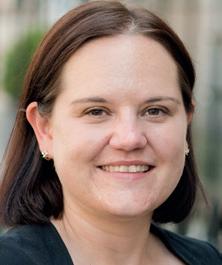

SARA COLLIER
Sara Collier, Public Afairs Manager at CPT Scotland since November 2022, collaborates with colleagues to convey members’ policy positions to Scottish Government, Parliament, and local authorities.
VALERIE DAVIDSON
Valerie was appointed as Chief Executive of Strathclyde Partnership for Transport (SPT) in December 2021. Her current focus is on the £288m Subway Modernisation, Smartcard ticketing, digital transformation, and enhancing public transport in the West of Scotland.
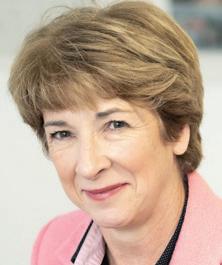

CATHERINE DE MARCO
Catherine is Partnerships Director at First Bus providing policy and strategy advice across the UK business. Previously, a 17-year civil service career included roles in rail, skills, innovation and local transport. Catherine’s consulting work in South Africa focused on addressing legacy apartheid land use planning related to bus services.
FIONA DOHERTY
Fiona is the Managing Director of Stagecoach West Scotland. She oversees a vast operation spanning seven local authorities, 10,000+ square miles, seven depots, 1,000 staf, and 400 buses. With over 30 years in transport and energy, she navigated the pandemic and worked with the Scottish Government on post-Covid growth. Fiona is Vice Chair of CPT Scotland and Chair of the Glasgow Bus Alliance. She is also a Board member in multiple Chambers of Commerce.
Margaret is a Public Health Consultant at Public Health Scotland and an Honorary Clinical Senior Lecturer at the University of Glasgow. She leads the Public Health and Sustainable Transport Partnership. Her work centres on using public policies in transport and other sectors to enhance health and diminish health disparities.
TIM


Tim recently retired as Director of Public Transport Services at the Irish National Transport Authority. In that role he managed all public transport services, a €1.2bn budget in 2023, and seven teams with 95 staf
Claire has been Scotland’s Trafc Commissioner since early 2019. She oversees heavy goods and public service vehicle operators’ licensing and regulation. She previously served as a Senior Investigating Ofcer and non-executive roles in health.

Lifelong Learning and then spent 11 years as Culture Secretary from 2009. She has been Transport Minister since June 2023.
ALISON IRVINE
Alison held policy and delivery roles in the Scottish Government, most recently leading the Cabinet, Parliament, and Governance Division. Before joining Transport Scotland, she worked for 18 years as a transport planner in consultancy.




JOHN LAUDER
John, who joined Sustrans in 2005 and later became Deputy CEO, is currently seconded to Scotland’s Railway, leading the Sustainable Travel to Stations strategy. Te goal is for 90% of passengers to use sustainable and active travel by 2035.
ANDREW LUCKETT
Andrew founded BluMarbl, energy experts leading the bus and coach industry’s zero-emissions transition. BluMarbl actively contributes to the ZE Coach Taskforce and manages CPT’s industry data project. Teir DfT-backed Operators Platform simplifes the proftable shif to zero emissions for operators.


LESLEY MACINNES
Lesley spent most of her career in public service. She later became an Edinburgh councillor, leading eforts on transport and the environment.
MARTIN MACPHAIL
Fiona was elected to the Scottish Parliament in 1999 and she has been Linlithgow’s constituency MSP since 2011. In 2007 she became Cabinet Secretary for Education &

Martin has been MacPhails’s Managing Director since 2002. He actively supports the coaching industry and served as the Scottish Coach Executive Chair during the pandemic.


 DR MARGARET DOUGLAS
GASTON
CLAIRE GILMORE
FIONA HYSLOP MSP
DR MARGARET DOUGLAS
GASTON
CLAIRE GILMORE
FIONA HYSLOP MSP
CLLR ANGUS MILLAR
Cllr Angus Millar currently serves as City Convener for Climate, Glasgow Green Deal, Transport and City Centre Recovery at Glasgow City Council. Angus represents the Anderston/City/Yorkhill ward covering Glasgow City Centre as well as the Anderston, Finnieston and Yorkhill areas of the city.
STUART PATRICK CBE

Stuart is the Chief Executive of the Glasgow Chamber of Commerce, an organisation he joined in 2009. He has spent over 25 years in urban economic development, including 17 years at Scottish Enterprise. He holds an MBA from Strathclyde University.
DAVID SIDEBOTTOM
David Sidebottom became Transport Focus’s Director in June 2011, having previously served as Bus Passenger Director and Passenger Link Manager. Prior to this, he represented energy consumers for over 11 years as regional director of Energywatch.
BRENT TODERIAN

Brent is a respected urbanist with 30+ years experience. He advocates for creative city-building. Brent was recently voted one of the 100 most infuential urbanists in history.

PAUL WHITE
As well as being Director of CPT Scotland, Paul is a non-councillor Board Member of SESTRAN and a previous Chair of the Scottish Transport Studies Group. Paul has worked in transport policy for almost 20 years across Scotland, Westminster and Brussels.
MON 2ND
OCT
1200-1300
Networking Lunch and Registration
1300-1310
CPT Scotland Chair Opens Conference
Duncan Cameron: Managing Director, First Bus Scotland
1310-1340
Ministerial Address
Fiona Hyslop MSP: Scottish Government Minister for Transport
1340-1425
A Shared Vision for Scotland’s Buses
Fiona Doherty: CPT Scotland Vice-Chair, MD Stagecoach West Scotland
Alison Irvine: Interim Transport
Scotland Chief Executive
Tim Gaston: ex-Director of Public Transport Services, National Transport Authority (NTA)
Cllr Angus Millar: Convener for Climate, Glasgow Green Deal, Transport and City Centre Recovery, Glasgow City Council
1425-1445
Public Health and Public Transport
Dr Margaret Douglas: Co-Director of the Master of Public Health programme, Edinburgh University
1445-1515
Tea & Cofee Break
1515-1600
Designing City Spaces

Catherine De Marco OBE: Partnerships Director, First Bus
Martin MacPhail: Director, MacPhail’s Coaches
Stuart Patrick CBE: Chief Executive, Glasgow Chamber of Commerce
Cllr Scott Arthur: Convener for Transport and Environment, City of Edinburgh Council


1600-1645
Redefning Accessibility
Sarah Boyd: Managing Director, Lothian Buses
Valerie Davidson: Chief Executive, SPT
John Lauder: ex-Deputy CEO, Sustrans
Lesley MacInnes: Committee Member, Mobility and Access Committee for Scotland
1645-1655
CPT Scotland Chair Day One Closing Remarks
Duncan Cameron: Managing Director, First Bus Scotland
TUES 3RD OCT
0900-1000


Networking Tea & Cofee
1000-1010
CPT Scotland Chair Day Two Welcome
Duncan Cameron: Managing Director, First Bus Scotland
1010-1055
Decarbonising Scotland’s Buses and Coaches
Paul White: Director, CPT Scotland
Andrew Luckett, Director, BluMarbl
Morna Cannon, Interim Director – Low Carbon Economy, Transport Scotland

Julia Meek, Director of Business Development and Marketing, Zenobe
1055- 1115
Trafc Commissioner’s Address
Claire Gilmore: Trafc Commissioner for Scotland
1115-1145
Tea & Cofee Break
1145-1230
Engaging with Our Audiences
Sara Collier: Public Afairs Manager, CPT Scotland
David Sidebottom: Director, Transport Focus
L-J Burrell, Economic Advisor, Department for Transport
1230-1315
In Conversation with Brent Toderian
1315-1325
CPT Scotland Chair Closes Conference
Duncan Cameron: Managing Director, First Bus Scotland
1325-1430
Networking Lunch


With over 200 EVs in operation around Scotland, to The World’s First Hydrogen Powered Double Deckers. The UK’s largest charging station, and an industry leading B2B charging scheme.





We don’t mean to toot our own horn, but First Bus are delighted to be leading the way in the transport revolution. Our sights are firmly set on reaching net-zero carbon emissions by 2035, and our journey has only just begun.

